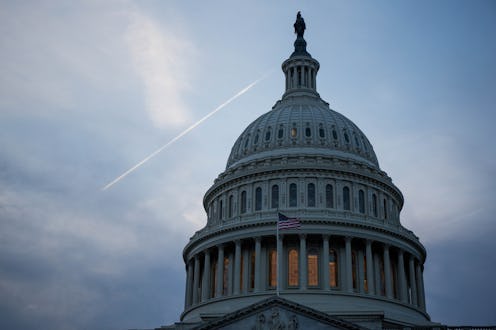News
11 Stories Of Faithless Electors From History
Just because this is the first year you've heard the term, faithless electors have often played a role in American history — if only a limited one. They've come up here and there, choosing to vote for one candidate over another for all sorts of different reasons.
Some of the reasons are what you might call minor, and others were fairly legitimate — like when a candidate died after Election Day but before the Electoral College met. No point in voting for that guy, right? One thing that all of these faithless electors have in common, though, is that their decisions to vote against their party never actually ended up swaying the results of the election. In every single case, even if a group of electors went rogue together, the candidate who won the electoral vote (or came closest, as you'll see) in the election went on to become president.
That's not the say that something different couldn't have happened in 2016, the year when everything went completely bonkers. But it was a warning to the faithless electors who want to make a difference — they've really got their work cut out for them. Now, without further ado, here are 11 stories from when one or more electors decided to break the pledge that they made to their party.
1796
Thomas Jefferson would become president eventually, but he lost when he ran against John Adams in 1796. Samuel Miles, the first faithless elector, was unhappy with that, and chose Jefferson over Adams, the candidate who he was pledged to vote for. Adams won by only three votes, and many voters were quite angry at Miles' decision.
1820
James Monroe was on course to win every since electoral vote, and one elector had a problem with that — so he voted for John Quincy Adams, who hadn't even run that year. But because of that elector, George Washington remained the only presidential candidate to be unanimously voted in by the Electoral College.
1832
1832 was apparently a mess — something like this year. Two people from one party abstained rather than voting for their presidential candidate, Henry Clay. Another thirty from the other party didn't like their vice presidential candidate, Martin Van Buren, so they voted for another guy. Tough for them — Van Buren still became the vice president.
1836
This was the one time that Congress actually came into play, when the 23 electors from Virginia heard that Democratic vice presidential nominee Richard M. Johnson had lived with a black woman (gasp!) and decided that they couldn't possibly vote for a person like that. Because of that, no candidate got the requisite number of votes, and the decision went to the Senate. When the Senate voted, Johnson became the VP anyway, despite Virginia's misgivings.
1872
In 1872, Horace Greeley ran on the Democratic ticket, lost, and then died before the Electoral College met. Most of the Democratic electors, understandably, cast their votes elsewhere — besides three who decided that being dead didn't disqualify Greeley from receiving their votes.
1960
In 1960, a Republican elector hated his own candidate, Richard Nixon, but didn't want to vote for the Democrat either (sound familiar?). He contacted a number of electors to try to convince them to vote for someone else, but in the end he was the only one to vote faithlessly. Kennedy went on to win the election.
1968
Richard Nixon was a bit to liberal for a North Carolina elector in 1968, so this elector insisted on voting for American Independence party candidate George Wallace instead.
1972
Ron Paul probably loved Republican elector Roger L. MacBride, who broke his pledge to the Virginia Republican Party in 1972 and instead voted for the presidential and vice presidential candidates from the Libertarian Party. Incidentally, the Libertarian VP candidate that year was Toni Nathan, the first woman to win an electoral vote.
1988
Michael Dukakis didn't get many electoral votes when he ran for president in 1988, and he lost one that he might have expected to have from a Democratic elector in West Virginia, who cast her vote for his vice presidential candidate in order "to make a statement" about the Electoral College as an institution.
2000
One of the District of Columbia's electors decided to abstain in 2000, in order to protest the fact that D.C. is not represented in Congress. That elector, while pledged to Al Gore to begin with, was not the reason that Gore lost.
2004
The last instance of a faithless elector, before 2016, happened in 2004, when an elector from Minnesota voted for vice presidential candidate John Edwards for president — and for vice president. The vote was anonymous, and many assumed that it was a mistake. Since then, however, Minnesota's electoral votes are no longer anonymous.
There were at least seven faithless electors in 2016, but they're unlikely to have done any good. Once the official tally comes in during the vote count Jan. 6, you'll be able to confirm how many electors went rogue in 2016. But for now, these are just some of the best stories from faithless electors in the past.
